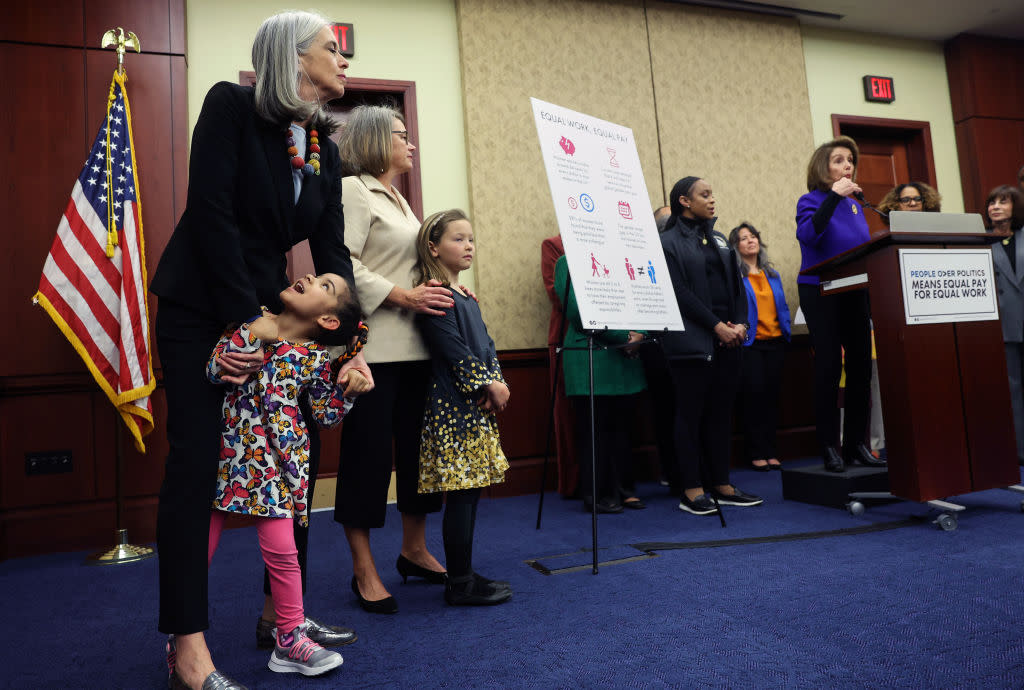Number of women running for office declines nationally, Rutgers center says

- Oops!Something went wrong.Please try again later.
U.S. Rep. Katherine Clark (D-MA) (L) holds Pherabe, 4, a child of a congressional staff member, as Rep. Nancy Pelosi (D-CA) speaks about equal pay in Washington, DC, on March 10, 2023. This week, a Rutgers center said fewer women are running for federal and statewide office. (Photo by Kevin Dietsch/Getty Images)
While the number of women running for federal office has waned nationally, New Jersey is seeing more women run this election cycle, including a Latina who was one of just four in the country to launch a campaign for Senate, according to a Rutgers University-based political center.
After voters elected women to Congress in record-breaking numbers in the last three election cycles, the number of women candidates is now down in nearly every category, staff members of the Center for American Women and Politics told reporters Tuesday.
Debbie Walsh, the center’s director, said while 2024 won’t be a record-setting year, there are several milestones on the horizon for women. She called it “incredibly prescient” to speak about women in politics this week in light of the news that Vice President Kamala Harris has secured enough support from Democratic delegates that she will likely win the Democratic Party nomination for president next month.
Walsh noted Harris would be the first Black woman and first Asian-American person to win a major party’s nomination for president.
“Should she go on to win in November, she will shatter what Hillary Clinton coined the highest, hardest glass ceiling in American politics. Our research and programming has long been oriented towards changing the perception of power, and this transformative moment would forever alter how Americans view leadership in politics,” she said.
Fifty women candidates filed to run for Senate nationwide in 2024, compared to 70 in 2022. Nine have won primaries in the 18 states that held them so far, and more than 30 women have filed in states that haven’t held their primaries yet, the center’s researchers said.
In races for the House of Representatives, 466 women have filed to run and 171 of them have won their primary, according to the center. That’s down from the 583 women who filed to run in 2020 and the 298 women who won their party’s nomination. More than 300 women are still in the running in states still holding primaries. The record for women nominees — 23 candidates — was set in 2018.
The number of Republican women House candidates saw the largest drop of 36% from 2020 to 2024, and in the Senate, nearly 45%, the center said. Democratic women candidates are down by about 7% in the House, and nearly 10% in the Senate.
The only new record broken this year was the number of Latina or Hispanic women running for U.S. Senate. Four Latinas ran for Senate, up from the previous record of three set in 2022.
One was New Jersey’s Patricia Campos-Medina, a labor leader who unsuccessfully sought the seat held by Sen. Bob Menendez, who last week was convicted of federal crimes and who announced his impending resignation Tuesday.
New Jersey has seen an increase in women who ran for House and Senate. Twelve women filed to run for federal office in the 2024 cycle — four Republicans and eight Democrats — up from eight in 2022, according to the center. In 2018, 16 women filed to run. During all three cycles, just two of those women — Rep. Mikie Sherrill (D-11) and Rep. Bonnie Watson Coleman (D-12) — won their elections.
The number of women representing New Jersey in D.C. may increase soon. In the House race in the 10th District, LaMonica McIver won the Democratic nomination last week to replace the late Rep. Donald Payne’s name on the ballot in the general election, and is also the Democratic nominee in the Sept. 18 special election to serve out the remainder of his term, which expires in January. McIver is the heavy favorite to win the overwhelmingly Democratic district.
New Jersey has never elected a woman to the U.S. Senate. In this year’s Senate race, both parties nominated men.
Women are historically underrepresented in elected office. Currently, 25 women serve in the 100-member Senate, and 125 women serve in the 435-member House of Representatives.
This year some states are poised to elect their first Black woman representative to Congress and their first female governor, while Delaware appears likely to elect Congress’ first transgender woman representative. The 2024 election could also result in the first time two Black women serve simultaneously in the U.S. Senate, Walsh said.
Kelly Dittmar, researcher at the center, said there’s an electability bias that works to the advantage of white men in politics. She noted this is a hurdle Harris may face.
“We’ve also seen attacks on Harris’ qualifications, something more common to women and especially to women of color, whose competencies are often questioned while for white men, they are more often assumed,” Dittmar added.
GET THE MORNING HEADLINES DELIVERED TO YOUR INBOX
The post Number of women running for office declines nationally, Rutgers center says appeared first on New Jersey Monitor.

